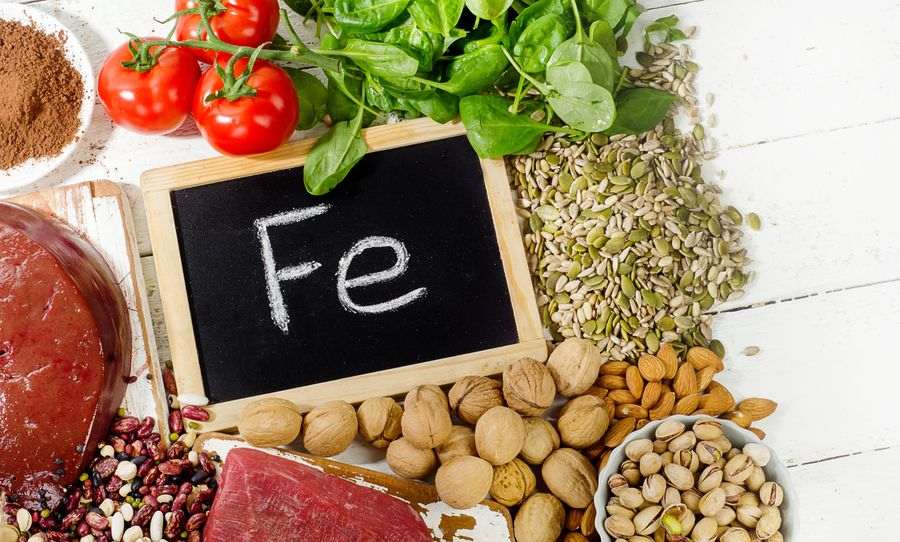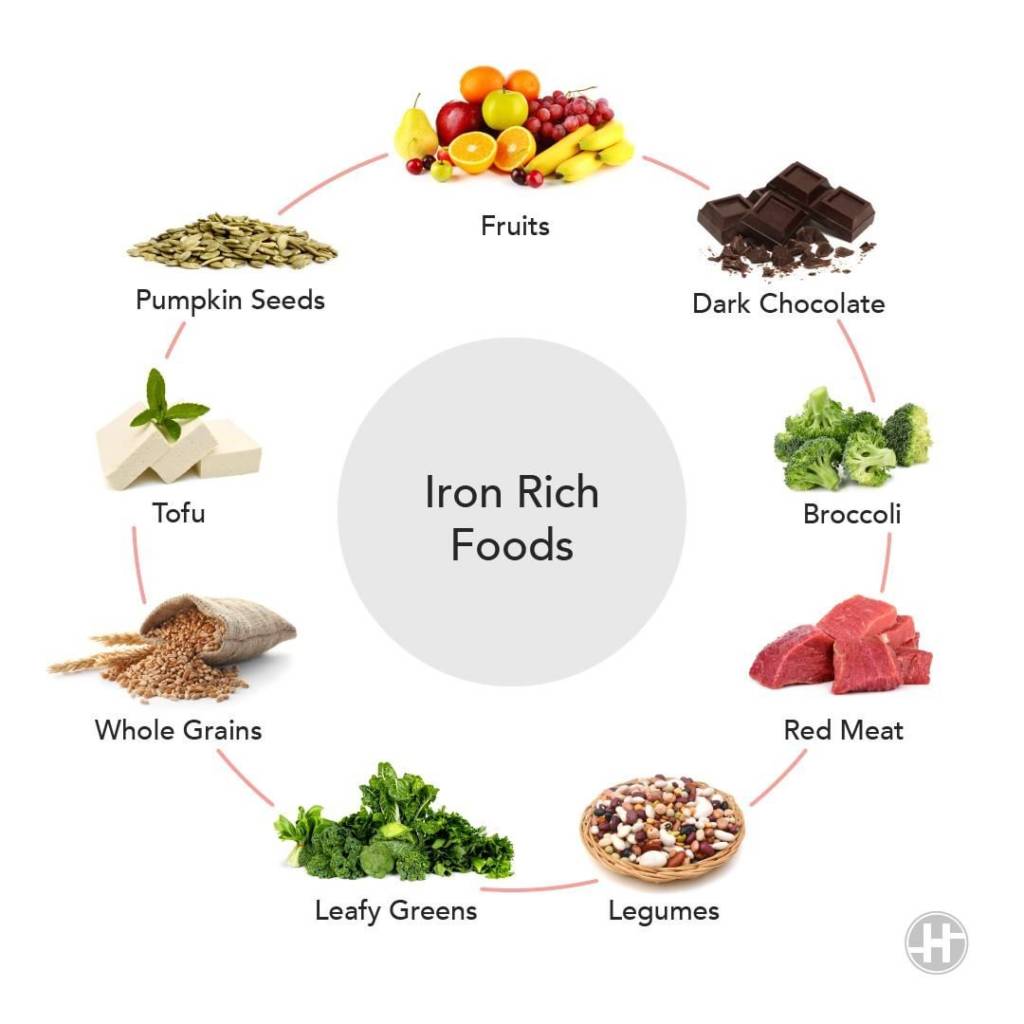Iron is an extremely important mineral, as your body needs it to produce red blood cells and carry oxygen.
When your diet lacks iron, it causes anaemia, dizziness, irritability, headaches, and fatigue. On average, you need to consume 18 mg of it every day, but the requirement varies depending on your age and gender.
For example, men need to consume 21 mg. Women who experience menstruation should have 18 mg of iron per day. For pregnant women, this figure reaches 35 mg daily.
The food you consume can provide two types of iron – heme and non-heme. Poultry, fish, and meat are some good sources of heme iron. In this form, your body can absorb the mineral easily, making it easier to increase their levels.
The second type, non-heme, comes from plant-based foods such as nuts, vegetables, and fruits. Although the absorption of this variant is a little more difficult, eating more foods rich in Vitamin C can help with that.
Table of Contents
8 Iron Rich Foods to Include in Your Diet
Add foods that are rich in the mineral to your diet, and improve your overall iron intake. Here’s a list of foods that can help you do the same:
1. Iron Rich Fruits
Fruits such as mulberries and olives should be added to your diet, as they have good quantities of iron.
For every 100 grams of olives you consume, you get 3.3 mg of this all-important mineral, which translates into 18% of your daily requirement.
They also provide vitamins E and A, good fats, fiber, and reduce the risk of suffering from heart diseases, making them a wonderful addition to your diet.
Mulberries have good nutritional value, as you get 1.9 mg of the mineral for every 100 g, which forms a sizeable portion of your daily requirement. When it comes to vitamin C, you get 85% of your dietary needs.
Thanks to the presence of antioxidants, these iron rich fruits protect your body against certain types of cancer, diabetes, and heart disease.
You can also have prune juice, which is consumed to help deal with constipation. From a cup of prune juice (237 ml), you get 3 mg of iron, which is 17% of what you need every day. They are also rich in manganese, vitamin B6, fiber, vitamin C, and potassium.
2. Iron Rich Whole Grains
Among many other nutrients, whole grains are rich in iron too. They provide a wide range of health benefits, including reduced risk of heart disease, type 2 diabetes and obesity.
Read more: Type 2 Diabetes Diet – A Comprehensive Guide
One cup of cooked quinoa will give you 2.8 mg of iron, which is equal to 16% of your daily needs. In addition to that, Gluten-free, quinoa is also rich in a vast number of nutrients such as minerals, complex carbohydrates, protein, minerals, vitamins, and fiber.
A single serving of oats gives you 3.4 mg of this nutrient, which is about 19% of your everyday requirement. At the same time, it provides folate, magnesium, fiber, zinc, and protein.
Due to beta-glucan, a type of soluble fiber, you feel full after consuming oats. Also, it boosts the health of your gut and decreases the level of blood sugar.
However, one must keep in mind whole grains, and not processed grains, are the healthy options. During the processing of grains, manufacturers remove parts which contain minerals, vitamins, fiber, and antioxidants.
3. Iron Rich Leafy Greens
Include beet greens, collard, swiss chard, kale, and spinach in your diet.
For every serving, you can get anywhere between 2.5 to 6.4 mg of iron, which accounts for 14% to 36% of your daily requirement. Complement these leafy greens with healthy fat, such as olive oil, allowing your body to absorb carotenoids.
4. Iron Rich Legumes
One serving of lentils (after cooking) can get you 6.6 mg of the mineral or 37% of your daily requirement. Similarly, all legumes are a great way to maintain the iron levels in your body. Soybeans, lentils, beans, peas, and chickpeas are some foods which fall into this category.
They are also good sources of potassium, folate, and magnesium. As they contain high amounts of fiber, you will feel full for longer. As a result of this, your calorie intake will reduce, which will help you lose weight.
5. Iron Rich Red Meat
Red meat is a great source of heme iron, decreasing the risk of suffering from deficiencies.
If you are vulnerable to anaemia, it is vital that you consume red meat on a regular basis. With a single serving of ground beef, a type of red meat, you can get 2.7 mg of iron or 15% of your daily requirement.
It also has vitamin B, selenium, protein, and zinc, making it nutritious at the same time. There was a study published on the National Center for Biotechnology Information which said women who eat meat after aerobic exercises retain iron better than the ones who consume its supplements.
6. Iron Rich Pumpkin Seeds
A good source of vitamin K, zinc and manganese, these seeds are also rich in iron. A 28 g serving of pumpkin seeds contains 4.2 mg of the mineral, accounting for 23% of the required daily intake.
In addition to this, the seeds are also rich in magnesium. Thus, it also helps reduce the risk of insulin resistance and diabetes. Easy to carry around, pumpkin seeds are a great food to snack at any time of the day.
7. Iron Rich Dark Chocolate
A single serving of dark chocolate can account for about 19% of your daily iron requirement. At the same time, you get magnesium, copper, and prebiotic fiber, which is also great for your health.
Another reason to add dark chocolate to your diet is due to its antioxidant content, which safeguard your cells from free radicals. Make sure that the dark chocolate you pick up has over 60% cacao, to get best results.
Flavanols, a compound in chocolate, is responsible for all its positive health benefits. Replace your milk chocolates with their dark variants. Rich in a range of minerals, they are delicious and nutritious at the same time.
8. Iron Rich Broccoli
A 1-cup serving of cooked broccoli contains 1 mg of iron, which is 6% of an individual’s required daily intake. Therefore, the vegetable is a fairly good source of the mineral.
An extremely nutritious vegetable, broccoli is also rich in fiber and vitamins, C and K. Cruciferous vegetables like broccoli, cauliflower and Brussels sprouts contain plant compounds that are believed to be protective against cancer.
Health Benefits of Iron
The health benefits of iron tend to be ignored till there is a deficiency of the mineral. Consuming the foods mentioned earlier has many health benefits, and we have listed down a few:
- Stronger Immune System
- Improved Muscle Strength
- Improved Cognitive Function
- Healthier Pregnancy
- Better Athletic Performance
Stronger Immune System
As iron promotes the production of red blood cells, they repair the cells and tissues, and therefore, improves the body’s immunity.
Having the right amount of the mineral in the body helps fight off a variety of infections and diseases. Consuming the right amount of iron on a daily basis will go a long way in improving the immune system of the body.
Improved Muscle Strength
Muscle weakness and iron deficiency are closely linked. Consuming enough iron rich foods helps provide the oxygen required for muscle contraction.
Low iron intake increases the chance of muscle fatigue. Its deficiency can also cause the inflammation of muscle tissues, thereby increasing pain levels. Thus, pain can be reduced by increasing consumption of the mineral.
Improved Cognitive Function
Another one of the many benefits of iron is the improved brain function. Approximately 20% of the blood oxygen is used by the brain and this oxygen supply is aided by it. Hence, the consumption of the mineral directly impacts the brain’s health and its functions.
Proper flow of blood in the brain stimulates brain activity and prevents cognitive disorders, making iron consumption key to good brain health.
Healthier Pregnancy
It is vital that the fetus gets sufficient supply of nutrients and oxygen, to support its growth. Due to this reason, the body requires greater amounts of iron, to keep up with the demand. When you eat foods which are great sources of the mineral, it increases the production of red blood cells and blood volume.
A pregnant woman’s body will make it a point to increase iron absorption. However, due to factors such as lack of consumption of iron rich foods or other reasons, it can cause a deficiency.
Lower amounts of the mineral can increase the chances of low weight or premature birth. At the same time, it can impair the behavioural or cognitive development of the newborn child. Ensuring the consumption of satisfactory amounts of iron during pregnancy will keep both the mother and the child healthy.
Better Athletic Performance
Athletes, especially women, are more prone to iron deficiency, even when compared to those who don’t lead active lives. Its deficiency isn’t a good sign, as it decreases your performance while making you vulnerable to a lot of diseases.
Also, during periods of physical exertion, you won’t be able to push your body to its limits. There isn’t enough haemoglobin to carry the oxygen to your muscles. If you are participating in long-distance runs or other types of endurance activities, you must eat more iron rich foods than you normally do.
Iron Deficiency
Since it is necessary to make haemoglobin, a shortage of mineral iron could lead to lower levels of red blood cells in the body. Lower levels of haemoglobin in your body mean your tissues and muscles will have less oxygen to work with. This could lead to a condition called anaemia.
Read more: Iron Deficiency: Prevention and Management
While there are different types of anaemia, iron deficiency anaemia is the most common across the world. Although poor diets are the most common causes of the deficiency, inflammatory bowel disease, increased requirements during pregnancy and excessive bleeding can lead to it too.
The following are a few symptoms of iron deficiency in the body:
- Unusual headaches
- Headaches or dizziness
- Shortness of breath
- Dry and damaged hair or skin
- Paleness
- Heart palpitations
- Restless legs
- Swelling and soreness of the mouth and tongue
Summary
Including iron rich foods is the best way to improve intake of the mineral. Including more iron in your diet can help you improve cognitive function, muscle strength, and your immune system, among several other health benefits.
Similarly, ignoring these foods can lead to its deficiency. This could give rise to a condition called anaemia, where there is a shortage of oxygen in your muscles and tissues.
In conclusion, improve your diet by including the foods mentioned above, and reap the many benefits of consuming iron.



